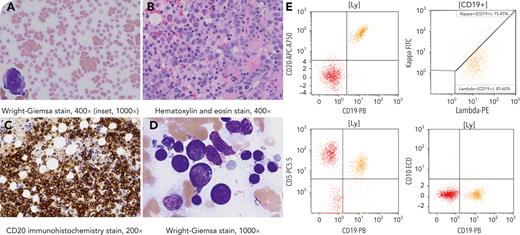A 57-year-old woman presented with a 1-week history of generalized weakness. Complete blood cell count revealed pancytopenia (hemoglobin, 8.7 g/dL; white blood cells, 2.2 × 109/L; platelets, 53 × 109/L). Peripheral blood smear showed marked red blood cell agglutination (panel A; 40× objective) with 2% atypical lymphoid cells (inset, 100× objective). Further workup demonstrated cold autoimmune hemolytic anemia (cAIHA) with increased serum lactate dehydrogenase (557-1500 U/L; range, 98-192 U/L) and a cold agglutinin titer of 160. There was no radiographic evidence of malignancy or lymphadenopathy. Bone marrow biopsy demonstrated unexpected diffuse large B-cell lymphoma (DLBCL) in a variably cellular (10%-90%) bone marrow (panels B [40× objective], C [20× objective], and D [100× objective]). Flow cytometry detected λ-restricted B cells (5%) with CD5+/CD19+/CD20+/CD38+/CD200+, without CD10 or CD34 coexpression (panel E). Lymphoma cells were positive for B-cell lymphoma 2 (BCL2), B-cell lymphoma 6 (BCL6), and multiple myeloma 1 (MUM1), and negative for cyclin D1 and terminal deoxynucleotidyl transferase (TdT) (immunohistochemistry, not shown). Cytogenetics revealed abnormal complex karyotype (47,X,-X,-2,dic[3;6][p21;p25],del[5][q22],-7,add[7][q32],add[10][q22],+18,+2-6mar[cp8]), with negative fluorescent in situ hybridization for v-myc myelocytomatosis viral oncogene homolog (MYC), BCL6, and immunoglobulin heavy chain (IGH)::BCL2 rearrangements.
Cold agglutinin syndrome is a rare type of autoimmune hemolytic anemia caused by cold-reacting autoantibodies secondary to infections, autoimmune diseases, or cancers. Lymphomas associated with cold agglutinin syndrome are usually indolent/low grade, with DLBCL extremely rare. This case emphasizes the importance of peripheral blood and bone marrow evaluation in patients diagnosed with cAIHA.
For additional images, visit the ASH Image Bank, a reference and teaching tool that is continually updated with new atlas and case study images. For more information, visit https://imagebank.hematology.org.


This feature is available to Subscribers Only
Sign In or Create an Account Close Modal